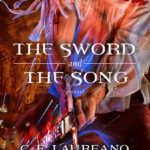Violence & The Time Lord
“Neither seek nor shun the fight.”
~ Gaelic proverb
Non-violent or pacifist?
Just for clarification: This is not a stance on the death penalty, war, self-defense, or revenge. I’m not even too concerned about the amount of any one of them in fiction (I think I at least touched it in my recurring themes post at some point, anyway). I’m more concerned about approach, I think. There’s a list of topics I think every sane person should revisit periodically, things I just don’t think should be taken lightly, and if we didn’t argue about them I’d be a bit worried. Among them is violent behavior (be it the death penalty, war, enhanced interrogation, beating the snot out of a schoolyard bully, or anything else that might fit here) and our response to it. So, if you’re really curious about my stance on violence in stories, simply put: There’s a time and a place for everything under the sun. I’m admittedly fascinated by the way writers choose to handle tough subjects, violence included. It underscores our frailties and reminds us how precious life really is–and the consequences of an evil that is quite real in the world. Justice is impossible without it. And that’s really about all I’m going to say on that.
That said: Doctor Who sent me down this road, so we’ll pick on the Doctor first. Supposedly, he’s a pacifist, but I’ll go to my grave disagreeing with everybody, including the Doctor, on that one. But you be the judge. The show itself, like I’ve said, is a bit finicky on its own philosophy sometimes. And before you yell at me, please remember I actually like that the Doctor considers violence last resort. On the one hand, you find resolve like this:
(Season 1)
Dalek: What’ll it be, Doctor, coward or killer?
The Doctor struggles a minute, then jerks his hands away from the controller: Coward. Always.
Note: For the record, I love this line because he’s neither killer nor coward, and that time he doesn’t care what anyone calls him for his decision. And this scene very quickly generates the idea that heroes are not quick to destroy, shameless when they refuse, and often guilt-riddled when they must.
(Season 3)
Doctor [after he and Martha successfully tricked the Master into thinking they had a secret weapon to kill Time Lords]: “Did you really think I would ever tell her to kill for me?”
(Season 4)
Wilfred [ offering a pistol to defend himself ]: “Take this.”
The Doctor: “I never, ever would.”
Note two: The season three snippet underscores the idea that revenge is not a viable notion: He won’t use a gun to defend himself, and he won’t ask someone else to do so, either.
(Season 5)
Doctor: I have three options: One, I let the starwhale continue in unendurable agony for hundreds of more years. Two, I kill everyone on this ship. Three, I murder a beautiful, innocent creature as painlessly as I can. And then I find a new name because I won’t be the Doctor anymore. [someone interrupts] Nobody talk to me; nobody human has anything to say to me today!
And I think this one speaks for itself. It tells a lot about the Doctor, but on top of all the good things, I think this whole scene also demonstrates that while he wants to do the right thing, he doesn’t always see every option or know what the right thing is. It’s actually Amy who figures it out, much to his relief. And I think to that end, there’s that more subtle indication that heroes don’t always have to know what they’re doing or even know what the right thing is to be decent people.
(Christmas Special)
Donna: They were burning and drowning and you stood there!
[Nevermind they were going to kill everyone, Donna, including you, and he did warn them first.]
Season 4:
[A Character about Martha]: “You made a soldier of her.”
But on the other hand, the Doctor clearly doesn’t have a problem destroying his entire planet (his own people, his own family, his own friends) to get rid of his biggest enemy, had no problem manipulating people into destroying themselves, took revenge on the Family of Blood, destroyed the Racnoss without blinking, time-locked the Time Lords a second time, and goes stark-raving mad every time he looks at a Dalek for more than two seconds.
Ironically enough, for all his fascination with humans and his insistence that his companions are the best humans in the world, the Doctor’s companions are also far more likely to resort to a weapon than he is: Martha carries a gun more than once; Rose turns the Daleks to dust using the Time Vortex and later herself shoots a Dalek; Donna…slaps people. River has no problem shooting people, and the Doctor even jokes about it. That’s a far cry from the Doctor’s almost threatening “Don’t you dare!” toward Jack Harkness in season four, btw. And that’s the primary criticism of one of his enemies: “You take ordinary people and fashion them into weapons.” He terrifies them to the point they run off without a fight, using fear as a weapon despite his hatred of such manipulation and oppression. He’s avoiding a fight. They’re plotting a revolt to destroy him. And so the Doctor lives in this constant danger of becoming the very thing he despises.
So is he a warmonger or a pacifist; a violent man or a man of peace? Good or evil? Somewhere in the middle, really. Just…don’t attack his friends.
So there you have it: I don’t think the Doctor’s a pacifist, but I also don’t think pacifists really exist, either. Push hard enough, someone’s coming out swinging.
The Charm of Restraint
All that said, in all fairness, there’s something particularly charming about a hero who doesn’t carry a weapon. Doctor Who is neither the first nor the last to work through when violence is appropriate and when it isn’t. Another contemporary favorite of mine is Eliot Spencer, in the show Leverage. He hates guns and usually doesn’t carry more than a knife, but even then tends to use only his hands and feet. To quote:
Nathan Ford: [Nate sees Sterling walk in behind Eliot] Eliot, I’m going to ask you not to do anything violent.
Eliot Spencer: What? What are you talking about? I only use violence as an appropriate response.
Jim Sterling: Hello, Nate.
[Eliot’s eyes widen and he whirls around and punches Sterling in the face]
(Season 3: Zanzibar Market Place episode)
Part of Eliot’s development is that he steps quickly out of his role as hitman/thug and into his role as team protector. I think part of why he stays with Nate is that Nate doesn’t make him act that way. As a result, part of Eliot’s redemption arc is taking the thing he despises about himself, a very dark thing, and using it to save instead of destroy.
Most of the stories I read or watch involve, on a one to ten scale, anywhere from a level five to ten on violence. The dominant theme of all of them tends to be what separates murder from justice, the avenger from the killer, the oppressor from the protector. What, exactly, makes a good man: The one who never fights, or the one who fights one way over another?
- The Patriot – Benjamin Martin is not a violent man, nor a particularly rebellious one, either. He tries the middle ground as long as he can, offering safe haven to anyone on both sides who comes through. But when one son is captured and another murdered before his eyes, he’s driven first to revenge, then to the American Revolution.
- Gladiator – Maximus was a bit overly trusting in the beginning , which is what got him in trouble, but despite the utter hell he goes through maintains his principles, even in a gladiator ring. Again, he’s not violent and has no concept of violence as entertainment.
- Braveheart – William Wallace hits the revenge theme, a revenge that only afterward expands to rebellion against England.
- Human Target – This show was canceled, but basically it was about an ex-assassin who as a means of penance offers his service as personal bodyguard. His teammates are a former cop, a professional thief, and an apparently still-active hitman and sniper. It focused more on the consequences of taking human life, both physical and psychological.
Book-wise, I could list plenty, but when you’re reading mostly fantasy, mystery, suspense, and psychological thrillers, some measure of violence is inevitable. I’ve been catching up on my Tim Downs, so I’ll just cite him. Downs (mentioned affectionately) has, at least for me, shown a wide range of using violence in different methods. He has a knack for making his protagonist look at gruesome images of dead (and usually rotting) bodies, but since the Bug Man is a forensic entomologist with glasses that make Coke bottle bottoms look thin, he doesn’t engage in much of the active, physical violence (although he gets himself in plenty of trouble either way). In Plague Maker, though, Nathan the FBI agent deals with far more violence in what turns out to be this beautiful story about forgiveness. Head Game is more psychological, and in some ways more chilling as a result: the head game isn’t in killing you; it’s in getting you to kill yourself through a chain of psychological attacks that, at least to me, created this morbidly fascinating depiction of spiritual warfare (I’ve also been thinking on that topic awhile; that was part of it).
And overall that’s what I find: Ideally the strong man isn’t a bully, but he can be pushed to his limits. He may or may not be aggressive by nature, but he’s not going to sit back passively, either. So there is a particular charm to the strongest character being simultaneously strong and gentle (Eliot isn’t really gentle, but he does have a gentler side that we get to see occasionally), to a character who clearly can defend himself and won’t on some overriding principle (that usually endangers him). And there’s a charm to the most powerful player preferring restraint over dominance. And that’s the charm of the Doctor’s only “weapons” being a sonic screwdriver, the TARDIS (which is more of a getaway vehicle than anything) , and his brain.
“Good men have too many rules.”
“Good men don’t need rules. And today is not the day to find out why I have so many.”
~Eyepatch Lady & The Doctor, A Good Man Goes to War
Edit: And I think I know my next topic: Psychological violence. Also, I apologize this isn’t as polished as I’d have liked. I could have gone so many directions with it.










































Very interesting!
Something I noted about the Doctor’s pacifist tendencies is that his character arcs back and forth.
Nine is very defensive; he’s seen a lot of killing recently (and I wonder what really happened on that last day of the Great Time War – what pushed him to do what he did) and doesn’t want to see it again… unless it’s Daleks, who he never wants to see again.
Ten starts off fairly pacifist but when he’s traveling alone, his deep emotional problems get the better of him (the Racnoss)… and because he’s getting more emotionally attached to his friends, the more he’s going to react when they’re in danger.
Eleven isn’t near as pacifist as the previous two – he still hates the individual act of killing, but he’s getting more and more protective of his friends. (… and now he’s started a war. I want to see how that turns out for him… it would have been completely out of character for anyone but Eleven – and he’s fighting mad now, that the villain did what she did to the people he cares about… I do believe that the whole kidnapping thing gets him more mad than if she’d killed them because he’d not have to get involved — now when he gets involved, he’s going to come at it with everything he’s got.)
So I expect that someplace by the next season he’s going to arc back to being more pacifist again since that’s an integral part of his character… at the least I think he’ll think twice before starting a war. XD
(and I think, from what I know about the first half of season 6 thanks to the TARDIS wikia, they’re going to explore this idea of what the Doctor’s become more in the second half of the season…
Some days, Jenni, I’m just grateful I made sense. 0=) Good run-down of all three, btw. Following the entire progression definitely lets you better see his progression as a character (and I don’t think I’d have caught that if you hadn’t pointed it out). And I think too, Eleven’s when he’s finally in a position he can start to heal, which, as you say, seems to be the thrust of the current story arc. I’m looking forward to how it all plays out, too.
The first Doctor was not entirely averse to violence. The third Doctor prided himself with his extensive knowledge of Venutian Karate. Non-violence in the Doctor did not really come to the fore until the fourth incarnation.
I’ve only just begun seeing episodes of the “new” Doctor Who series. I’ve noticed that, whereas in the “classic” series the sonic screwdriver was a tool, in the new series the Doctor uses it like a beam weapon… often.
I haven’t seen any of the old ones. I saw most of Unearthly Child (or, at least, it didn’t seem like the whole episode) and noticed he’s still that relatively cool personality even way back then. Thanks for sharing; I’ve been curious how much of the new series is a modern spin on a show that might not have gone there otherwise (the sex/homosexuality stuff I just don’t see happening, or the ‘tolerance’ motif, or the whole violence/pacifism thing). For the new series, I can’t tell if it’s author intrusion/cultural recontextualization or if the idea is the Time War left a bitter taste in his mouth. Maybe both.
What do you think happened? Was it a cultural shift or just a new aspect not yet revealed in the earlier ones?
Yeah…I don’t think Nine did it as much as Ten, and Eleven seems to think it’s Han Solo’s laser gun. Still not quite sure what I think about that one. I still kinda prefer the Doctor who invents weapons as he goes along.
Wilfred [ offering a pistol to defend himself ]: “Take this.”
The Doctor: “I never, ever would.”
I was just watching that scene to make a fanvideo the other day, and that scene, coupled with his response to “a star fell from the heavens–” that says a lot about his character, enough for an essay in itself.
I heard a quote secondhand that said you can tell if someone’s good by what makes him or her angry. I would add that after that, you need to look at how they act when angry. And season six, especially the most recent (what did you think of it, btw?) really shows that he’s going over the edge again, but in a different way then the Time Lord Victorious, in a slower, slightly less obvious way…
On a lighter note, I love your list of responses by companion–
Martha carries a gun more than once; Rose turns the Daleks to dust using the Time Vortex and later herself shoots a Dalek; Donna…slaps people
And I’ve seen enough of the classic series to know this happens to an extent with some of those companions too–Romana, for example, or for an inverse, Leela, who the Doctor has to constantly admonish about her janis thorns and dagger…
Wilfred really needs to come back. If no one else can, he should.
You’re gonna have to remind me where the star quote is from. But yeah.
Well said.
Yeah, they’re raking him over, but I think in a way it may turn out worse than before – he hides behind that mask now, and it’s being ripped off. So yeah, definitely agree.
Rory rocks. And I’m a sadist who likes watching characters pushed over the Cliffs of Insanity. They had to hit the entire emotional spectrum and nailed it. I don’t remember one wasted line or moment. You?
Haha. Thanks. Donna’s probably got the most aggressive personality of the companions I’ve seen. I’m still not completely sure I liked Rose with a gun or rocket launcher or whatever it was in season four, just because it seemed…out of place. I mean, it looked cool. Still.
Edit: And I’d be interested in seeing the video when you’re ready.
I absolutely love these discussions….
And to take the last thing first: video is
End of Time clips to “The Steward of Gondor” from RotK soundtrack. Love comibing two great geek passions. The quote “A star fell from the heavens” comes from the Master’s open broadcast, where he found the diamond from the Time Lords. The announcement of a white-point diamond (which can only be found on Gallifrey) frightens the Doctor so much that he picks up the gun Wilf had been trying to force on him.
Good Man Goes to War–Yeah, I have that sadist side too. I tend to kill off original characters at an alarming rate. And the last five minutes were pure gold–absolutely gold, building the suspense for viewers before cutting away to the title for next fall. “Let’s Kill Hitler!”
For the new series, I can’t tell if it’s author intrusion/cultural recontextualization or if the idea is the Time War left a bitter taste in his mouth. Maybe both.
I’ve seen over seven classic seasons, and I think he probably had that tendacy a little originally, but the horror of the Time War made him more sensitive to violence, and paradoxically, more violent when provoked.
Kind of like someone who doesn’t like meat visits a slaughterhouse…
Galadriel – I think the video got pulled; I couldn’t watch.
On the star – Oh, that’s right. I just forgot what they called it.
You too, huh? Hehe. It’s such a challenge to keep characters alive…
I know. ::snicker:: I’m really curious where they’re going with it and 99% sure the title’s a total mislead.
That would make sense.
Bother. It is. Well, I could email it to you if you want…
If it’s not too much trouble, I’d love to see it. If it’s a hassle, no worries. 0=)